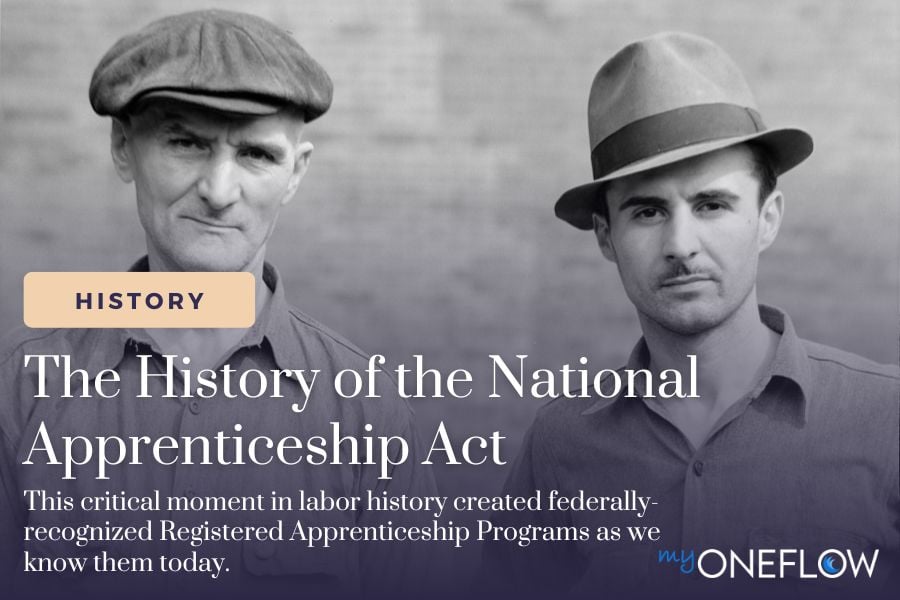2 min read
10 Amazing Stats That Show the Value of Registered Apprenticeship Programs
myOneFlow Staff Updated on February 17, 2025

Happy National Apprenticeship Week! This important event serves as a yearly reminder of the vital role apprenticeships play in strengthening our workforce and propelling our economy. It's an opportunity to spotlight the victories of apprentices, the rewards for employers, and the overall positive impact these schemes have on our society. Apprenticeships play a crucial role in workforce development, offering benefits for apprentices, employers, and the economy. Here are ten apprenticeship statistics that highlight the importance and impact of Registered Apprenticeship Programs in the United States:
- Employers experience positive post-program benefits between $25,000 and $30,000 from each program.
- Apprentices who complete their program earn an average annual starting salary of over $70,000.
- The typical employer experiences a 44.3% ROI on Registered Apprenticeship Programs.
- Registered Apprenticeship Programs have an average of 92% employment retention rate after apprentices complete the program.
- In fiscal year 2021, 96,000 individuals completed their apprenticeships in the United States.
- RAPs span 150,000 employers in more than 1,000 occupations.
- Since fiscal year 2014, there has been a growth of 118% in the number of apprentices completing their training annually, from 44,417 to 96,915 by the end of FY 2021.
- The Biden-Harris administration's increased emphasis on Registered Apprenticeships has facilitated the creation of over 4,000 new programs, attracted 6,700 additional participating employers, and generated employment opportunities from more than 1 million RAPs.
- A well-developed apprenticeship system can boost earnings and minimize occupational segregation within the labor market.
- Employers who hire apprentices frequently see improved productivity, profitability, and bottom line.
These statistics underscore the value of apprenticeship programs, not just for the apprentices themselves but also for businesses and the broader economy. By investing in apprenticeship programs, employers can develop a highly skilled workforce and improve their bottom line. At the same time, apprentices gain valuable job experience and training that can lead to higher-paying careers. This symbiotic relationship between businesses and apprentices is a key factor in the success of apprenticeships.
National Apprenticeship Week is an annual celebration to bring attention to these valuable programs and their incredible benefits. Apprenticeships are an essential component of our employment landscape, fostering the development of highly skilled workers and contributing to the betterment of businesses and the larger economy. Whether you're an employer, a potential apprentice, or a workforce development stakeholder, this week is the perfect opportunity to explore the advantages of apprenticeships.
Want more apprenticeship resources? Read about the history of the National Apprenticeship Act, explore simplified compliance guidelines for Registered Apprenticeship Programs, or check out these best practices for a successful apprenticeship program.
Frequently Asked Questions
- What are the key benefits of participating in a registered apprenticeship program?
Registered apprenticeship programs offer hands-on experience, industry-recognized credentials, and pathways to well-paying careers. Participants gain practical skills while earning an income, and employers benefit from a reliable talent pipeline, reducing training and recruitment costs. - How do registered apprenticeship programs impact career growth and earnings potential?
Research shows that individuals who complete registered apprenticeships tend to experience higher career earnings and better job security. These programs provide a solid foundation for long-term career growth by equipping participants with in-demand skills. - What types of industries benefit most from registered apprenticeship programs?
Registered apprenticeship programs are highly beneficial in industries with skill shortages, such as construction, healthcare, information technology, and manufacturing. These industries often require specialized skills that can be effectively developed through structured, hands-on training.
Latest Insights

The History of the National Apprenticeship Act
The history of apprenticeships in America is as old as the nation itself. British artisans and tradespeople came to the colonies to help build and...
.jpg)
5 Best Practices for a Scalable & Successful Apprenticeship Program
Apprenticeships provide an excellent opportunity for employers and job seekers to build long-term, mutually beneficial relationships. By combining...

